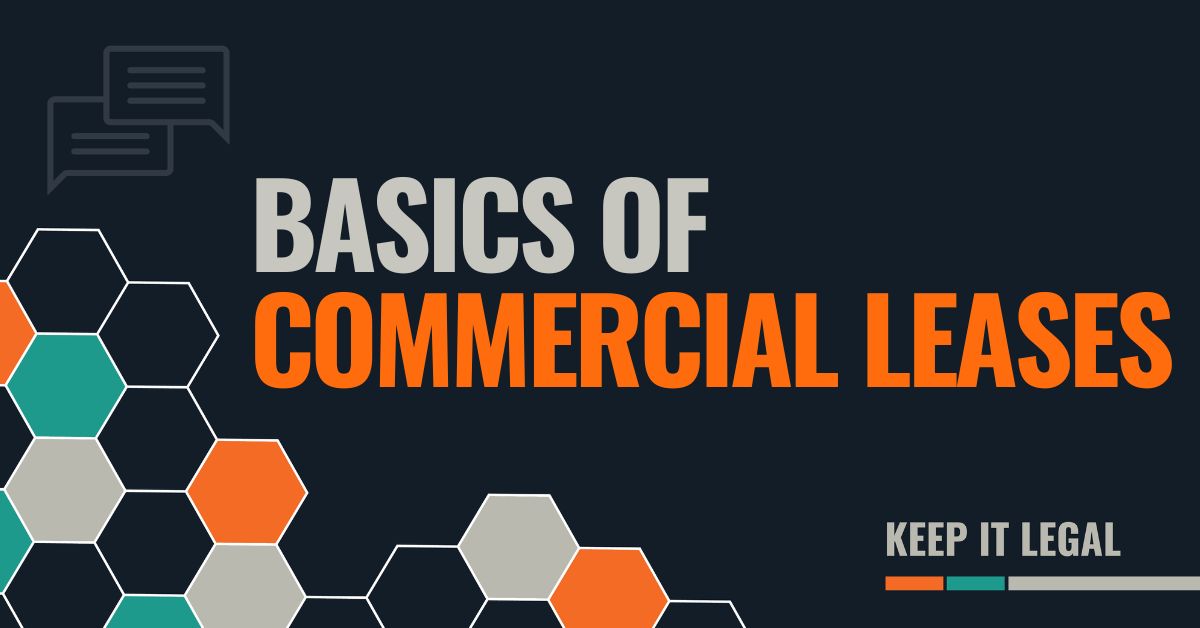Commercial Leases: What Every Business Owner Should Know
Whether you’re setting up your first storefront or relocating your corporate offices, navigating the world of commercial leases can be complicated. This post is designed to make that process a bit more manageable by covering key elements you need to know before signing any commercial lease. Of course, this post can’t cover every issue that comes up – it’s intended to be a high-level overview. We can go into details about various issues in future blog posts.
The Basics: What is a Commercial Lease?
Simply put, a commercial lease is an Agreement that allows a business owner to rent a space for commercial activities. Unlike residential leases, which are often standardized, commercial leases can vary widely in their terms and conditions. So it’s essential to know exactly what your business is agreeing to. This is where the advice of strategic legal counsel can come in.
Types of Commercial Leases
There are several types of commercial leases, including:
- Gross Lease: You pay a fixed monthly amount and the landlord covers all other property expenses.
- Net Lease: You pay the base rent, plus, often, one of the following: property taxes, insurance, and maintenance costs.
- Triple-Net Lease: You pay the base rent and all of the property’s operating expenses (proportional to your space), including taxes, insurance, and maintenance. This type of lease can offer a lower monthly rent but can expose you to fluctuations in operating costs.
- Percentage Lease: Rent is based on a fixed minimum plus a percentage of your monthly sales. This is common in leases for stores, restaurants, or locations where services are sold onsite. The advantage (in theory) is that both you and the landlord are incentivized to make sure there is foot traffic and the business succeeds.
Understanding the type of lease you’re entering into will have implications for your operational budget, so make sure you know the difference.
Negotiating Terms: It’s More Than Just Rent
When you’re presented with a commercial lease Agreement, you’ll notice it’s not just a simple rent-for-space deal. Here are some terms you should be aware of:
- Lease Term: This is the length of the Agreement. Short-term leases offer more flexibility, but long-term leases may provide rent stability. Often, there are also renewal terms – be sure you understand who has the right to renew (extend) the lease, for how long, and at what cost.
- Rent Escalations: This clause explains how and when the rent will increase over the term. It’s common for rent to increase by a fixed percentage on an annual basis.
- Security Deposit: Know how much you’ll need upfront, and the conditions under which you’ll get it back.
- Maintenance and Repairs: Clarify who is responsible for what.
- Exit Strategy: Conditions for terminating the lease should be clearly defined, including any penalties for breaking it early.
- Personal Guarantee: For small or new businesses, landlords often require one or more individuals to personally guarantee the lease. This means that if the company goes out of business or simply fails to pay the rent, the landlord can go after you personally for the unpaid rent plus interest and other damages, such as attorney’s fees.
Even Big Companies Run Into Commercial Lease Issues: Starbucks v. Simon Property Group
In 2017, Starbucks wanted to close 77 of its Teavana stores located in malls owned by Simon Property Group. However, their commercial lease agreements included “continuous operation covenants,” which legally required the stores to remain open. Starbucks tried to exit these agreements but faced legal challenges. A court ruled in favor of Simon Property Group, emphasizing the importance of understanding lease terms before signing. Even a huge corporation like Starbucks can be caught up in commercial lease issues; they were in need of strategic legal counsel.
Takeaways
Leasing a commercial space is a significant commitment that should not be taken lightly. From understanding the type of lease to knowing the ins and outs of the Agreement, it’s crucial for business owners to be informed.
If you have a question about a lease or a business contract, feel free to contact me.


